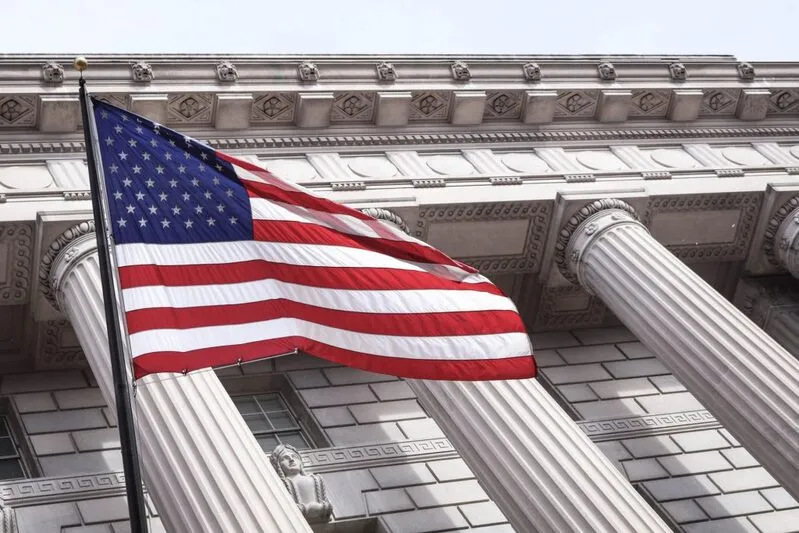Crypto regulation could unlock trillions of dollars and help solve the US fiscal deficit, according to former Goldman Sachs executives. With America’s debt reaching $36 trillion right now and annual interest payments exceeding $1 trillion, comprehensive crypto regulation presents a viable solution. Institutional crypto adoption is accelerating rapidly. This creates regulated crypto markets that offer unprecedented crypto investment opportunities to address the nation’s financial challenges.
Also Read: Senator Lummis Introduces Bill to Remove Crypto Tax Under $300
Why Crypto Regulation Could Solve The US Deficit And Drive Adoption

The math behind how crypto regulation could solve America’s deficit is becoming clear, and frankly, the numbers are pretty compelling. Financial institutions are embracing this new regulatory landscape at unprecedented rates. 44% are now willing to offer bank accounts to crypto businesses. This surge in institutional crypto adoption demonstrates how well-regulated crypto markets can generate substantial tax revenue and economic activity across the board.
Institutional Capital Unlocks Trillion-Dollar Opportunity
The growth in institutional crypto adoption has been explosive. We’re talking about a jump from just 61 holders back in March 2024 to over 3,300 by February 2025. This rapid expansion in regulated crypto markets creates massive crypto investment opportunities. These could significantly impact federal revenues in ways we haven’t seen before.
At the time of writing, industry leaders are particularly optimistic about the potential. Ira Auerbach, Head of Tandem at Offchain Labs, stated:
“By providing definitive regulatory guardrails for stablecoins, it clears the final major hurdle for institutional adoption. This regulatory catalyst unlocks immense capital and innovation.”
The comprehensive crypto regulation framework enables stablecoins to reach projected values of $1.6 trillion by 2030. That creates substantial economic activity that generates tax revenue across multiple sectors.
Trump Administration Accelerates The Regulatory Shift
The regulatory shift under the new crypto regulation policies has been pretty dramatic, to say the least. President Trump’s executive order declaring crypto a national priority fundamentally changed the landscape for institutional crypto adoption and the broader regulated crypto markets.
Brian Armstrong, Chief Executive of Coinbase, had this to say:
“To have the leader of the largest GDP country in the world come out undeniably and say that he wants to be the first crypto president, he wants the industry to be built in America and he’s going to direct every agency of the US government to work towards clear rules which enable innovation – this is unprecedented.”
This approach to crypto regulation creates the exact conditions necessary for regulated crypto markets to flourish and generate the economic activity needed to address the deficit problem.
Anthony Scaramucci, Founder of SkyBridge Capital, stated:
“[If] we get regulatory clarity on stablecoins in the US and our central bank accepts that legislation, it will permeate into the other banks.”
Economic Impact Of The New Regulatory Framework
The revenue potential from proper crypto regulation extends way beyond traditional taxation models. Current institutional crypto adoption demonstrates how regulated crypto markets create multiplier effects throughout the economy, and that’s where things get really interesting.
With Bitcoin reaching $2.16 trillion in market capitalization right now, the crypto investment opportunities now rival traditional assets in terms of scale. This level of market size generates economic activity that produces tax revenue across banking, technology, and financial services sectors.
The former Goldman Sachs perspective reflects broader Wall Street recognition that crypto regulation isn’t speculative policy—it’s pragmatic economics at this point. When institutions deploy capital at trillion-dollar scales through regulated crypto markets, the resulting economic activity and tax revenue become significant enough to meaningfully address America’s fiscal challenges.
Also Read: Goldman Sachs Leaked as Ripple Co-Investor, Coinbase and Wood React
The opportunity for crypto regulation to solve the US deficit lies not just in direct taxation, but also in the comprehensive economic growth that institutional crypto adoption creates across the entire financial system.






